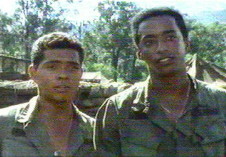 |
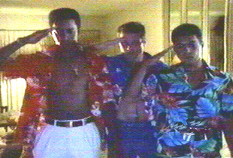 |
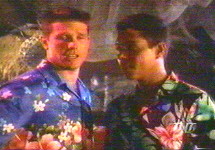
By Lee Russell
 |
 |

This was another "reduced cost" show, but it turned out to be one of our
best, I think. It was my personal favorite. Everyone assigned to Vietnam was
eligible for a Rest and Recreation (R&R) leave once during their Vietnam
tour. This was a five to seven day (depending on the destination) trip to any
of half a dozen Asian countries, or to Honolulu, Hawaii. The military flew
you there and back. Hotel accommodations were arranged, but paying for your
stay was your responsibility. Each destination had its own attraction. The
choice of an R&R was one of the most carefully considered decisions you got
to make. Returnees from each R&R were debriefed for details and alternatives
were discussed. Going with a friend was better than going
alone. Eventually you made your choice, thirty days ahead of time, as I
recall, and then, one day, the moment would come. You'd be taken from your
unit and flown back to base camp (Chu Lai for our guys) get your Class B
khakis fixed up and then fly on a chartered Boeing 707 to, well, Paradise.
In this episode, Ruiz and Taylor, having carefully considered their options,
have chosen an R&R to Bangkok, Thailand, famous for low cost partying and
female companionship. As they prepare to depart, their friend Percell is sent
on emergency leave to Hawaii where his hell-raising Dad has suffered a
near-fatal heart attack. They decide to go with him instead. Honolulu was
generally the choice of married men, whose wife would fly out to join
them.Hawaii was also one of two seven-day R&R's (the other was Sydney,
Australia) which meant two days less "in-country". It was also the only R&R
destination where you could drive a car, which was very important to some
people. Changing your R&R destination at the last minute was an
administrative nuisance, but was possible. Zeke has to call in favors for
this one.
What happens to Percell is largely based on the experience of one of my
friends, after a similar event. He was pulled out of a serious Tet Offensive
battle and flown to his dying father's side in a southern European country.
His father died before he got there, and he was authorized to stay on for the
funeral. To the annoyance of his
relatives, my friend displayed little grief or emotion. He had seen so many
friends suffer and die. He basically went out and had a good time. Really,
what else could he do?
One of the things that people were uneasy about were the rumors about "back
home." Being in the military, and especially being in Vietnam, cut us off
from the swiftly changing pop culture of the '60's. We had no direct contact
with people our own age. The new replacements told stories about how the mood
of the country was changing. It was turning against the war, and even those
fighting it. No one knew what to expect. The girl our guys meet at the bar
gives them a chilling update,
especially Percell.
The character of the bitter veteran, Rudy Morales, a paraplegic now consigned
to a VA hospital, was based on an incident in Dr. Ronald J. Glasser's
book,"365 Days". So was the death of "Sweet Harold" a soldier so badly burned
his race could not be determined. (The soldier's name was Harold Sweet, so
the placard by his bed read: "Sweet, Harold".) A Roger Henry Sweet, an Air
Force enlisted man, did die in Vietnam but this wasn't him. Glasser had
changed the name. The research people who were supposed to check on stuff
like this missed this reference.
What our guys do on R&R was based on my own experiences and some of my
friends', such as systematically ordering all the fancy drinks on the menu,
singing Army cadence calls in hotel corridors and waking up "regular" hotel
guests. In the script, but cut for time, is a scene where our guys splash
through surf, singing an irreverent antiwar cadence call: "Lyndon, Lyndon,
heed my plea, I don't want to die in the Infantry.....".) There is a poignant
scene where our guys return to their hotel room to see the routine television
station sign-off. One of the letters the show got was from a group of Vietnam
vets who used to gather in a bar to watch the show. When our guys stop and
salute the National Anthem, everyone in the bar stood up and did so too.
Morales' final advice, that our guys should desert rather than go back to
Vietnam, was based on my friend's experience. When he returned from emergency
leave, his friends were outraged that he had not taken the opportunity to
desert. It had occurred to him, of course, but there was never any question
of him NOT going back.
Costuming notes. This was the first time we had to decide who gotten what
medals by this stage of their tour. We had to do this VERY quickly and
everyone got involved, the costumers, the Army Public Affairs Office, myself
and even the actors. The ribbons are also worn in a certain order too, and it
is a nuisance to add one or remove one. Percell's uniform was the least
trouble. He is wearing the one he flew to Vietnam in months before. Taylor
had been wounded in "Notes from Underground," so he gets a Purple Heart, but
how about Ruiz? Even the actor couldn't remember. The result was kind of a
compromise, but we got no viewer complaints. The small colored pins worn on
the Class A Service Cap denote the unit. As the 3/44th Infantry was
fictional, there was no "correct" device. I could have designed one, but
there was no time to do so. Our guys wear the insignia of the real 3/21st
Infantry, a part of
the real 196th Infantry Brigade.
The cab driver jokingly refers to Ruiz and Taylor's "civilian clothes," the
khaki trousers from their Class B uniforms, and their black military shoes
and socks. They also wear their Army issue web belts-all trademarks of low
paid soldiers off-duty. This was one of my contributions. The cab driver also
refers to his own military service in WW II, with the Japanese-American 442nd
Regimental Combat Team. His
account is correct. Even after their families were interned in relocation
camps, many thousands of Japanese-Americans volunteered to fight for the
United States. The 442nd RCT, which fought in Italy and France, was among the
most highly decorated units of WW II. Unlike other WW II veterans,
Japanese-American veterans often returned to face prejudice at home.
.
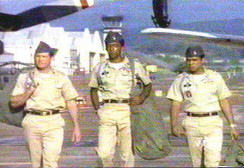
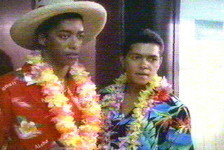 |
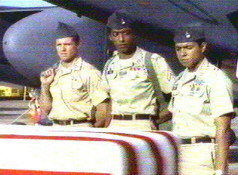 |
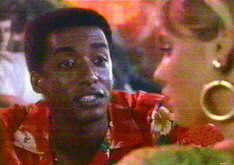
Next/Gray Brown Odyssey